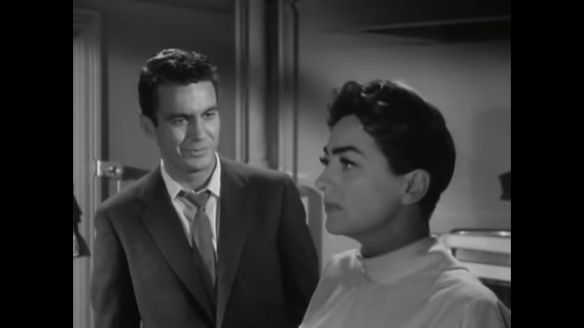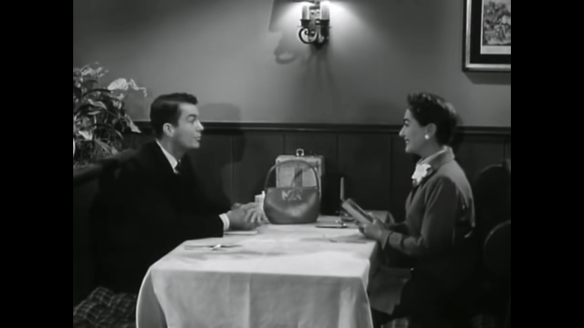You might not immediately connect Joan Crawford and Nat King Cole, but his brand of velvet crooning provides a fine backdrop (and namesake) for Autumn Leaves. It presents the consummate leading lady with a lighter more congenial personality — the kind of Joan Crawford who seems easier to connect with.
She’s known for her typing speed, working from home before it was en vogue, and banging out manuscripts for thankful clients. Although she leads a solitary existence alone, she’s buddy-buddy with her landlady and seems generally contented with life. When she goes out to a show or dinner, she’s comfortable going alone — it doesn’t feel foreign to her — and she enjoys her time in solitude.
There’s a moment in Autumn Leaves as Crawford sits in an audience, the lights go out so the spotlight is only on her, and the pianist on the stage takes her back into her memories. It felt so reminiscent of a scene in Penny Serenade where music, whether live or on vinyl somehow fills up the human heart and carries with it so many easily-tapped emotions.
“Autumn Leaves” feels less like a gimmick to cash in on the season’s newest love song, and it starts to pervade and then slowly suffuse throughout the entire movie until it becomes the tactful accent to almost every scene of the ensuing romance.
Because this all feels like a prelude. We have yet to meet our other primary player. Cliff Robertson was from the east coast and an actor forged out of his training at the Actor’s Studio. He’s still fresh-faced and Autumn Leaves was his second truly substantial movie role after the movie adaptation of Picnic with William Holden.
When he steps into the bustling restaurant and eyes Milly in the one booth with an extra seat, he makes his way over. There’s a disarming approachability about him. It starts to melt the ice and break down the barriers between him and his new acquaintance. Partially because there’s no threat to him though he’s still good-looking. Rather you feel like you can get to know the guy and like him. And she does.
They spend time together, going out more and even taking day trips. It’s a mutually beneficial relationship, and yet I hesitate to use these terms because it makes it sound mercenary. In the most innocent ways, they just enjoy one another’s company, and it shows.
The former Army veteran shows off his beach body on one outing chasing Milly into the waves. He feels like a movie creation. Can Joan Crawford have her own version of a 1950s manic pixie dream boy? But this is only a momentary suggestion. He becomes more of a person in the ensuing scenes. When she prods him about his old girlfriends, he shrugs them off. “Young people are too young for me,” he says.
If they do seem like an odd couple, they aren’t totally unprecedented. Because while loneliness is not a foundational reason to get married, it’s true we need each other. Burt believes that sometimes you meet someone and you know; they provide something you are lacking. I’m reluctant to say they complete you. Still, maybe with someone else’s hand to hold, it makes the world just a little less lonely and the pain a little less galling. Milly loves him and after minor reservation, falls into his arms for better or for worse.
They have a bit of marital bliss below the border, and yet something starts happening. Burt lets bits of his biography slip. All very matter-of-factly and there’s nothing guileful about it; it feels innocent enough, but she begins to realize they don’t match up. First his hometown, then his military service, and there are other discrepancies.

Then, Vera Miles shows up on her doorstep as a manifestation of all her sinking fears about Burt. His insinuating father (Lorne Green) is next to appear. There was a time when the movie could have easily been Joan Crawford’s Middle of The Night. Instead, she becomes devastated by the newfound revelations about her husband, and then must become protectorate shielding her love from the unfeeling world all but ready to exacerbate his condition.
She’s ready to battle for him. If it’s not righteous anger then it’s certainly indignant anger. She sees people for who they really are and calls them on it. Whatever Burt’s shortcomings, he has everyday, common decency. Her maledictions against the character of others might seem excessive (“Your filthy souls are too evil for hell itself”), and yet she’s not entirely wrong. If nothing else, she’s lashing out as a defense mechanism.
However, she’s also caught in the most excruciating of conundrums — one of those scenarios where it seems you are required to do something against your nature out of the deepest sense of sacrificial love, even if it’s not perceived as such. Her deepest longings are for Burt to be born again — that he might live a new, better life than he had before. It leaves the door open for another outcome. It’s very possible if he overcomes his illness, he might come out on the other side as a man who wouldn’t need her anymore. It’s either keep him for herself or watch him return to a happy, normal life (without her).
In the meantime, Burt isn’t getting better. In fact, his circumstances are far worse, and so Crawford is stirred to action. One of the film’s more pronounced shots is of Crawford as she reaches for the phone and resolves to make the fateful call. The low angle makes her loom large in the frame, not so much in a threatening way, but expressing just how much magnitude this moment is imbued with. Her eyes flicker slightly, this way and that, before she speaks into the receiver. There is no turning back.
Whether it’s purely a credit to the scenario, the direction, or the winsomeness of Crawford, I’ve never felt so devastated for her before. She’s put through the emotional wringer, not from noir tension or antagonism, but the kind of burden cutting deep and breaking your heart in the most tender of ways. She’s rarely been more sympathetic and her fortitude is easy to admire.
The final moments are quick, but that is not to say they aren’t pregnant with meaning. The couple is reunited, and I will leave the rest up to you to experience. Robertson and Crawford make the movie work, and this whole story hangs in the balance of their rapport. They weather both the mundane and the melodrama together. It’s pleasantly captivating watching them.
4/5 Stars


At first glance, it seems like an atypical or uncharacteristic film for both Crawford and Aldrich, but it acts as a satisfying end to that section of her career that saw it revived with Mildred Pierce. And Aldrich demonstrates again that that there was much more to his filmmaking than a superficial cynicism or sourness.
You give a good account of the movie’s strengths here and it would be nice if a few more people became aware of it.
LikeLiked by 1 person
Thank you for reading, Colin. And you make a good point about Aldrich. Autumn Leaves does seem almost like an outlier in his filmography, but if anything it shows another contour of what he could do.
LikeLiked by 1 person
I generally don’t watch Joan Crawford movies that she made past a certain point, so Autumn Leaves wasn’t a film that I ever planned to watch. For some reason (I think it was on TCM while I was working from home), I checked it out, and was surprised at how engaging it was. I enjoyed reliving it here!
LikeLiked by 1 person